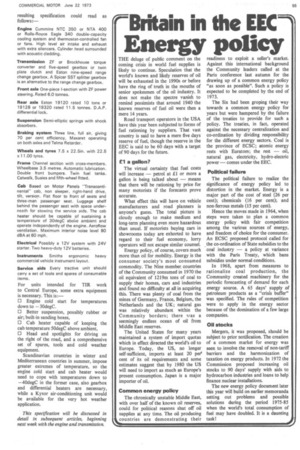rr'Britain in the EECN
Page 57

If you've noticed an error in this article please click here to report it so we can fix it.
Energy policy
THE deluge of public comment on the coming crisis in world fuel supplies is likely to continue. Speculation that the world's known and likely reserves of oil will be exhausted in the 1990s or before have the ring of truth in the mouths of senior spokesmen of the oil industry. It does not make the spectre vanish to remind pessimists that around 1940 the known reserves of fuel oil were then a mere 14 years.
Road transport operators in the USA have this year been subjected to forms of fuel rationing by suppliers. That vast country is said to have a mere five days reserve of fuel, though the reserve in the EEC is said to be 60 days with a target of 90 days for the future.
£1 a gallon?
The virtual certainty that fuel costs will increase — petrol at El or more a gallon is being talked about — means that there will be rationing by price for many motorists if the forecasts prove accurate.
What effect this will have on vehicle manufacturers and road planners is anyone's guess. The total picture is cloudy enough to make medium and long-term planning even more hazardous than usual. If motorists buying cars in showrooms today are exhorted to have regard to their fuel economy, lorry operators will not escape similar counsel.
Energy policy, of course, covers much more than oil for mobility. Energy is the consumer society's most consumed commodity. The Nine member, countries of the Community consumed in 1970 the oil equivalent of 1219m tons of coal to supply their homes, cars and industries and found no difficulty at all in acquiring this. There was plenty of coal from the mines of Germany, France, Belgium, the Netherlands and the UK; natural gas was relatively abundant within the Community borders; there was a seemingly endless ocean of oil from Middle East reserves.
The United States for many years maintained a system of import quotas which in effect directed the world's oil to Europe. Today, the US, no longer self-sufficient, imports at least 20 pei cent of its oil requirements and some estimates suggest that by 1980 the US will need to import as much as Europe's present consumption. Japan is a major importer of oil.
Common energy policy
The chronically unstable Middle East, with over half of the known oil reserves, could for political reasons shut off oil supplies at any time. The oil producing g, countries are demonstrating their readiness to exploit a seller's market. Against this international background the Community leaders called at the Paris conference last autumn for the drawing up of a common energy policy "as soon as possible". Such a policy is expected to be completed by the end of 1973.
The Six had been groping their way towards a common energy policy for years but were hampered by the failure of the treaties to provide for such a policy. The treaties, in fact, operated against the necessary centralization and co-ordination by dividing responsibility for the different energy sectors. Coal is the province of ECSC; atomic energy rests with Euratom; the rest — oil, natural gas, electricity, hydro-electric power — comes under the EEC.
Political failure
The political failure to realize the significance of energy policy led to distortion in the market. Energy is a major part of the cost of steel (26 per cent); chemicals (16 per cent); and non-ferrous metals (15 per cent).
Hence the moves made in 1964, when steps were taken to plan a common energy policy with fair competition among the various sources of energy, and freedom of choice for the consumer. An ECSC proposed protocol called for r the co-ordination of State subsidies to the coal industry — a policy at variance with the Paris Treaty, which bans subsidies under normal conditions.
In 1968, apart from measures to rationalize coal production, the Community created machinery for the periodic forecasting of demand for each energy source. A 65 days' supply of petroleum products as a "crisis buffer" was specified. The rules of competition were to apply in the energy sector because of the domination of a few large companies.
Oil stocks
Mergers, it was proposed, should be subject to prior notification. The creation of a common market for energy was seen to involve the removal of non-tariff barriers and the harmonization of taxation on energy products. In 1972 the Commission proposed increasing oil stocks to 90 days' supply with aids to hydrocarbon industries and loans to help finance nuclear installations.
The new energy policy document later this year will build on earlier memoranda setting out problems and possible solutions during the period 1975-85 when the world's total consumption of fuel may have doubled. It is a daunting task!




















































































































